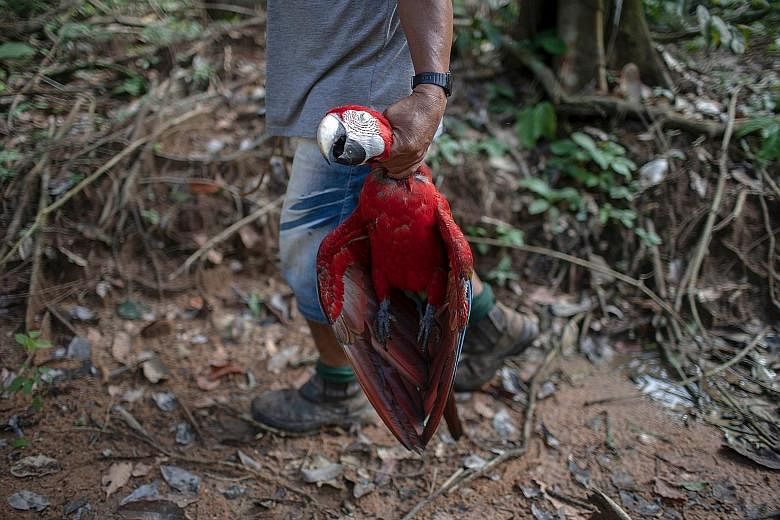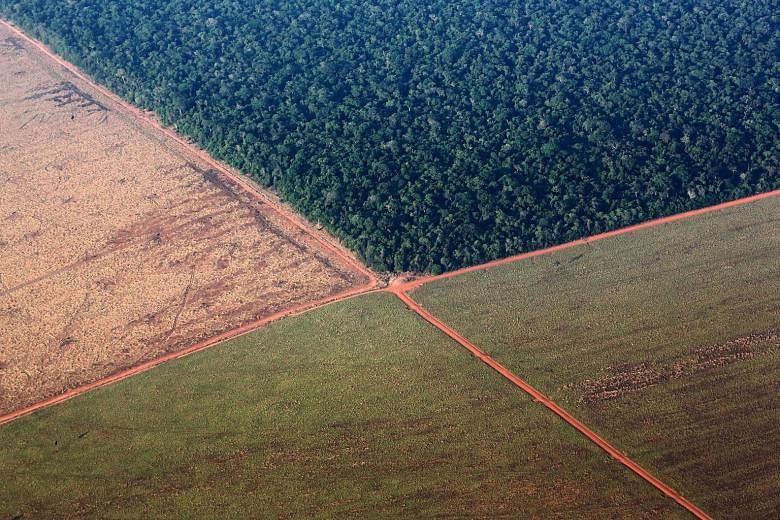A global assessment of life on earth says nature is declining at an unprecedented rate and the pace of extinction of plants and animals is accelerating, putting at risk economies and the well-being of all people.
Up to a million species are threatened with extinction and mankind needs to make urgent and sweeping changes to economies and the way goods are produced and consumed to stem the rapid decline of nature, says the report from the Intergovernmental Science-Policy Platform on Biodiversity and Ecosystem Services (IPBES) released yesterday in Paris.
The 1,800-page United Nations report is the world's most comprehensive review of mankind's impact on the planet's immense variety of life, or its biodiversity.
It took three years to compile and involved 145 experts from 50 countries. The authors and representatives from over 130 nations met in Paris last week to finalise a much shorter summary for policymakers.
The assessment is a report card on the way humans have reshaped the planet in a matter of decades to fuel economic growth and feed billions more people.
The conclusions are alarming and show that mankind is stripping the planet of its resources at an unsustainable rate and causing severe damage via the destruction of lands and seas, climate change, pollution and other pressures.
"Unless we act now to reduce the loss of biodiversity, we will undermine human well-being for current and future generations," IPBES chair Robert Watson told a press conference in Paris yesterday.
"Biodiversity is important for human well-being, and we humans are destroying it," he said, adding that biodiversity was not only an environmental issue, but an economic, development, security, social, ethical and moral issue.
The authors, who reviewed about 15,000 scientific and government sources, found that the rate of global change in nature during the past 50 years is unprecedented in human history.
In that time, the global economy has grown nearly fourfold and global trade tenfold.
As nations grow their economies, they are consuming more, wasting more, causing more pollution and damaging the very life-supporting ecosystems that have nurtured human societies. Nature provides the food we eat, from the plants that we use to grow crops, the soils in which they grow, to water from rivers and clean air filtered by forests.
Coral reefs, for instance, are home to a quarter of all marine species and fisheries on which hundreds of millions of people depend.
Yet climate change is warming the oceans and damaging reefs, while over-fishing is decimating fish stocks.
Vast tracts of tropical rainforests have been cleared for agriculture, such as soya, rubber, oil palm and pulpwood plantations.
Yet rainforests contain some of the richest concentrations of species on the planet, are key stores for water that feeds rivers and clouds, and are a source of medicines, such as cancer drugs, for millions of people.
Forests help soak up some of mankind's planet-warming carbon dioxide emissions, so cutting them down speeds up climate change.
The report says 75 per cent of the land environment and 66 per cent of the marine environment have been significantly altered by human actions.
Three-quarters of global food crops, including fruits and vegetables, rely on pollination.
However, the decline in pollinators such as bees and beetles threatens annual global crop production worth up to US$577 billion (S$786.6 billion).
Pollution is also pushing nature to the brink.
Plastic pollution has increased tenfold since 1980, the report says, while between 300 million and 400 million tonnes of heavy metals, solvents, toxic sludge and other industrial wastes are dumped annually into the world's waters.
Professor Watson said climate change would increasingly become one of the main threats to nature and it was urgent that the world used energy more wisely and cut greenhouse gas emissions.
Dr Anne Larigauderie, executive secretary of IPBES, said that despite the findings, the authors wanted to give a message of hope.
"We don't want people to feel discouraged, that there is nothing that can be done, that we have lost the battle. Because we have not lost the battle.
"And if given the chance, nature will reconquer its rights and will prevail," she told the press conference.
• Additional reporting by Chang Ai-Lien and Vanessa Liu
What governments, businesses and consumers can do to protect and nurture nature
Despite the gloomy outlook for nature, the IPBES assessment says there is much that is, and can be, done to protect and restore degraded ecosystems, from reefs and fisheries to forests and farmlands.
But it requires urgent, transformative change in the way economies function; to waste and energy management, and to attitudes towards the way people value nature and its benefits.
It requires greater cooperation between governments, tougher regulations on pollution and waste, and for businesses to incorporate nature and sustainable development into everything they do.
The key is rapidly cutting the pollution from burning fossil fuels, which is heating up the planet.
For consumers, it comes down to being more selective and informed about what they buy, where it comes from and how it is made, as well as the energy used at home and transport choices.
In agriculture, the report points to the need for better soil and watershed management, preserving the diversity of native crop varieties and species, improved supply chains, localisation and reduced food waste.
For marine ecosystems, the report suggests more effective fisheries quotas and better enforcement, creating marine protected areas, cutting pollution run-off into oceans and cracking down on illegal and unregulated fishing.
Overhauling cities can also make a difference.
Increased use of "green infrastructure" can improve life for city dwellers while also boosting efforts to minimise the impact of climate change.
More green spaces, lakes and other water bodies for plants and animals - as well as rooftop gardens and urban agriculture - can help cities regulate temperatures, improve air quality and reduce food transport costs. They also bring people closer to nature.
The authors say changing mindsets is also key - for example, enabling visions of a good quality of life without ever-increasing material consumption.
Also important is instilling a better sense of responsibility for the impacts associated with consumption, and better sharing of knowledge on how to preserve and protect nature. This can include, for instance, learning from indigenous groups how to live more environmentally friendly lives.
David Fogarty




